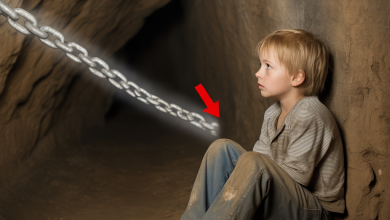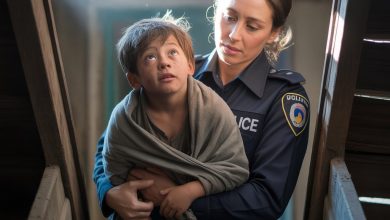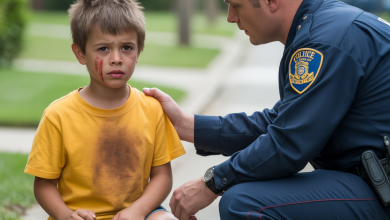She Was the Police Officer Who Rescued Them. She Became the Mother Who Gave Them a Home.
The call came in at 5:12 a.m., a dispatch for a routine welfare check on a quiet street in Oklahoma City. For Officer Hannah Lopez, it was the familiar start to another long shift. But the house at 1743 Sycamore Avenue was not routine. What she found behind its peeling paint and neglected porch would not only uncover a hidden nightmare but would set her on a path that would change the course of her life, and the lives of two small children, forever.
After being reluctantly let into the home by the children’s father, Dakota, Hannah was hit by an oppressive stench of urine and rot. He led her up a creaking staircase to a closed door, secured with a baby gate that had been haphazardly nailed to the frame. “They’re in there,” he said, avoiding her eyes. “We lock it sometimes, you know, for safety.” With a small key, he turned the lock. The door clicked open, and Hannah stepped into a horror.
Two small children stood in the center of the room. Both were completely naked, their skin streaked with filth. The floor beneath them was a biohazard, coated in dried feces and urine. The walls were covered in scribbles made from their own waste. There were no beds, no toys, no furniture, just a single, urine-soaked mattress shoved in a corner. The older child, a boy of about four, stared at her with wide, sunken eyes. He was holding a toddler, a little girl, wrapped in a filthy blanket. Neither of them made a sound.
This was more than neglect; it was a prison. Hannah’s training kicked in. She called for immediate backup and EMS, her voice steady despite the tremor she felt in her soul. The boy, who she would later learn was named Jason, finally spoke. “She cried a lot,” he whispered, his eyes still fixed on her. “So I told her stories.”
That single, heartbreaking sentence revealed the truth. This four-year-old boy had not just been a victim; he had been a protector, a storyteller, a tiny soldier trying to keep his two-year-old sister, Emma, safe in an unimaginable world.
The children were rescued that day. Their parents, Dakota and his pregnant girlfriend, Freeman, were arrested. But for Hannah, the case didn’t end when the ambulance drove away. She couldn’t shake the image of Jason, standing like a stoic guardian in the middle of that squalor. She was haunted by the silence of children who should have been laughing and playing, but who had learned that making noise was dangerous.
The investigation that followed painted an even darker picture. A hidden nanny cam in the room revealed footage of the abuse—the children being shoved, their food being withheld, left alone in the dark for days at a time. An interview with a neighbor confirmed that the crying had been heard for months, but fear of “making trouble” had kept her from intervening.
Hannah found she couldn’t stay away. She began visiting Jason and Emma at the hospital and later at their temporary care facility. She didn’t come in her uniform, but in jeans and a hoodie, carrying picture books and a small stuffed bear. A quiet, gentle bond began to form. Jason, who was mostly silent with his caregivers, would talk to Hannah. He showed her his drawings. He asked her about her house. Emma, who had been withdrawn and fearful, began to light up when she heard Hannah’s voice.
One day, the caseworker, Camille, gave Hannah the news that she had been dreading. There were no relatives stepping up to take the children. Sibling units, she explained, are notoriously difficult to place in the foster system. The very real possibility that Jason and Emma would be separated loomed over them.
It was in that moment that a dangerous thought, one that had been lingering in the back of her mind, finally took root. “I’ve seen that look before,” a pediatric nurse told her during one of her visits. “The one that says someone has to do something. Followed by the harder thought. Maybe that someone is me.”
Hannah knew it was crazy. She was a single woman, a police officer with a demanding, unpredictable job. But she also knew she couldn’t let these children, the ones she had pulled from the darkness, fall through the cracks of a broken system. She picked up the phone and started the foster care application process.
Three weeks later, on a bright Saturday morning, the doorbell rang at her clean, quiet apartment. Jason stood on the other side of the screen door, a backpack on his shoulders. Emma was beside him, clutching a purple flower. Hannah opened the door, and Jason, without a word, stepped forward and wrapped his small arms around her waist. She held him tightly. Then, he looked up at her, his voice a soft whisper, and asked the one question that mattered more than any other. “Is the door going to stay open?”
Hannah’s voice caught in her throat. “Yes,” she promised him. “Always.” In that moment, she wasn’t just Officer Lopez anymore. She had become something more. A mother, not by birth, but by a choice made in the aftermath of a tragedy. The rescue on Sycamore Avenue hadn’t ended that day. It was just the beginning.




